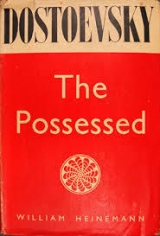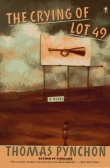
Текст книги "The Possessed"
Автор книги: Федор Достоевский
сообщить о нарушении
Текущая страница: 15 (всего у книги 49 страниц)
Stepan Trofimovitch made her a very, very low bow.
“It's for you to decide, Darya Pavlovna; you know that yon are perfectly free in the whole matter! You have been, and you are now, and you always will be,” Varvara Petrovna concluded impressively.
“Bah! Now I understand it all!” cried Pyotr Stepanovitch, slapping himself on the forehead. “But . . . but what a position I am put in by all this! Darya Pavlovna, please forgive me! . . . What do you call your treatment of me, eh?” he said, addressing his father.
“Pierre, you might speak to me differently, mightn't you, my boy,” Stepan Trofimovitch observed quite quietly.
“Don't cry out, please,” said Pierre, with a wave of his hand. “Believe me, it's all your sick old nerves, and crying out will do no good at all. You'd better tell me instead, why didn't you warn me since you might have supposed I should speak out at the first chance?”
Stepan Trofimovitch looked searchingly at him.
“Pierre, you who know so much of what goes on here, can you really have known nothing of this business and have heard nothing about it?”
“What? What a set! So it's not enough to be a child in your old age, you must be a spiteful child too! Varvara Petrovna, did you hear what he said?”
There was a general outcry; but then suddenly an incident took place which no one could have anticipated.
VIII
First of all I must mention that, for the last two or three minutes Lizaveta Nikolaevna had seemed to be possessed by a new impulse; she was whispering something hurriedly to her mother, and to Mavriky Nikolaevitch, who bent down to listen. Her face was agitated, but at the same time it had a look of resolution. At last she got up from her seat in evident haste to go away, and hurried her: mother whom Mavriky Nikolaevitch began helping up from her low chair. But it seemed they were not destined to get away without seeing everything to the end.
Shatov, who had been forgotten by every one in his corner (not far from Lizaveta Nikolaevna), and who did not seem to know himself why he went on sitting there, got up from his chair, and walked, without haste, with resolute steps right across the room to Nikolay Vsyevolodovitch, looking him straight in the face. The latter noticed him approaching at some distance, and faintly smiled, but when Shatov was close to him he left off smiling.
When Shatov stood still facing him with his eyes fixed on him, and without uttering a word, every one suddenly noticed it and there was a general hush; Pyotr Stepanovitch was the last to cease speaking. Liza and her mother were standing in the middle of the room. So passed five seconds; the look of haughty astonishment was followed by one of anger on Nikolay Vsyevolodovitch's face; he scowled. . . .
And suddenly Shatov swung his long, heavy arm, and with all his might struck him a blow in the face. Nikolay Vsyevolodovitch staggered violently.
Shatov struck the blow in a peculiar way, not at all after the conventional fashion (if one may use such an expression). It was not a slap with the palm of his hand, but a blow with the whole fist, and it was a big, heavy, bony fist covered with red hairs and freckles. If the blow had struck the nose, it would have broken it. But it hit him on the cheek, and struck the left corner of the lip and the upper teeth, from which blood streamed at once.
I believe there was a sudden scream, perhaps Varvara Petrovna screamed – that I don't remember, because there was a dead hush again; the whole scene did not last more than ten seconds, however.
Yet a very great deal happened in those seconds.
I must remind the reader again that Nikolay Vsyevolodovitch's was one of those natures that know nothing of fear. At a duel he could face the pistol of his opponent with indifference, and could take aim and kill with brutal coolness. If anyone had slapped him in the face, I should have expected him not to challenge his assailant to a duel, but to murder him on the spot. He was just one of those characters, and would have killed the man, knowing very well what he was doing, and without losing his self-control. I fancy, indeed, that he never was liable to those fits of blind rage which deprive a man of all power of reflection. Even when overcome with intense anger, as he sometimes was, he was always able to retain complete self-control, and therefore to realise that he would certainly be sent to penal servitude for murdering a man not in a duel; nevertheless, he'd have killed any one who insulted him, and without the faintest hesitation.
I have been studying Nikolay Vsyevolodovitch of late, and through special circumstances I know a great many facts about him now, at the time I write. I should compare him, perhaps, with some gentlemen of the past of whom legendary traditions are still perceived among us. We are told, for instance, about the Decabrist L– n, that he was always seeking for danger, that he revelled in the sensation, and that it had become a craving of his nature; that in his youth he had rushed into duels for nothing; that in Siberia he used to go to kill bears with nothing but a knife; that in the Siberian forests he liked to meet with runaway convicts, who are, I may observe in passing, more formidable than bears. There is no doubt that these legendary gentlemen were capable of a feeling of fear, and even to an extreme degree, perhaps, or they would have been a great deal quieter, and a sense of danger would never' have become a physical craving with them. But the conquest of fear was what fascinated them. The continual ecstasy of vanquishing and the consciousness that no one could vanquish them was what attracted them. The same L–n struggled with hunger for some time before he was sent into exile, and toiled to earn his daily bread simply because he did not care to comply with the requests of his rich father, which he considered unjust. So his conception of struggle was many-sided, and he did not prize stoicism and strength of character only in duels and bear-fights.
But many years have passed since those times, and the nervous, exhausted, complex character of the men of to-day is incompatible with the craving for those direct and unmixed sensations which were so sought after by some restlessly active gentlemen of the good old days. Nikolay Vsyevolodovitch would, perhaps, have looked down on L– n, and have called him a boastful cock-a-hoop coward; it's true he wouldn't have expressed himself aloud. Stavrogin would have shot his opponent in a duel, and would have faced a bear if necessary, and would have defended himself from a brigand in the forest as successfully and as fearlessly as L– n, but it would be without the slightest thrill of enjoyment, languidly, listlessly, even with ennuiand entirely from unpleasant necessity. In anger, of course, there has been a progress compared with L– n, even compared with Lermontov. There was perhaps more malignant anger in Nikolay Vsyevolodovitch than in both put together, but it was a calm, cold, if one may so say, reasonableanger, and therefore the most revolting and most terrible possible. I repeat again, I considered him then, and I still consider him (now that everything is over), a man who, if he received a slap in the face, or any equivalent insult, would be certain to kill his assailant at once, on the spot, without challenging him.
Yet, in the present case, what happened was something different and amazing.
He had scarcely regained his balance after being almost knocked over in this humiliating way, and the horrible, as it were, sodden, thud of the blow in the face had scarcely died away in the room when he seized Shatov by the shoulders with both hands, but at once, almost at the same instant, pulled both hands away and clasped them behind his back. He did not speak, but looked at Shatov, and turned as white as his shirt. But, strange to say, the light in his eyes seemed to die out. Ten seconds later his eyes looked cold, and I'm sure I'm not lying – calm. Only he was terribly pale. Of course I don't know what was passing within the man, I saw only his exterior. It seems to me that if a man should snatch up a bar of red-hot iron and hold it tight in his hand to test his fortitude, and after struggling for ten seconds with insufferable pain end by overcoming it, such a man would, I fancy, go through something like what Nikolay Vsyevolodovitch was enduring during those ten seconds.
Shatov was the first to drop his eyes, and evidently because he was unable to go on facing him; then he turned slowly and walked out of the room, but with a very different step. He withdrew quietly, with peculiar awkwardness, with his shoulders hunched, his head hanging as though he were inwardly pondering something. I believe he was whispering something. He made his way to the door carefully, without stumbling against anything or knocking anything over; he opened the door a very little way, and squeezed through almost sideways. As he went out his shock of hair standing on end at the back of his head was particularly noticeable.
Then first of all one fearful scream was heard. I saw Lizaveta Nikolaevna seize her mother by the shoulder and Mavriky Nikolaevitch by the arm and make two or three violent efforts to draw them out of the room. But she suddenly uttered a shriek, and fell full length on the floor, fainting. I can hear the thud of her head on the carpet to this day.
Last updated on Wed Jan 12 09:26:22 2011 for eBooks@Adelaide.
The Possessed, by Fyodor Dostoyevsky
Part II Chapter I. Night
EIGHT DAYS HAD PASSED. Now that it is all over and I am writing a record of it, we know all about it; but at the time we knew nothing, and it was natural that many things should seem strange to us: Stepan Trofimovitch and I, anyway, shut ourselves up for the first part of the time, and looked on with dismay from a distance. I did, indeed, go about here and there, and, as before, brought him various items of news, without which he could not exist.
I need hardly say that there were rumours of the most varied kind going about the town in regard to the blow that Stavrogin had received, Lizaveta Nikolaevna's fainting fit, and all that happened on that Sunday. But what we wondered was, through whom the story had got about so quickly and so accurately. Not one of the persons present had any need to give away the secret of what had happened, or interest to serve by doing so.
The servants had not been present. Lebyadkinwas the only one who might have chattered, not so much from spite, for he had gone out in great alarm (and fear of an enemy destroys spite against him), but simply from incontinence of speech-But Lebyadkin and his sister had disappeared next day, and nothing could be heard of them. There was no trace of them at Filipov's house, they had moved, no one knew where, and seemed to have vanished. Shatov, of whom I wanted to inquire about Marya Timofyevna, would not open his door, and I believe sat locked up in his room for the whole of those eight days, even discontinuing his work in the town. He would not see me. I went to see him on Tuesday and knocked at his door. I got no answer, but being convinced by unmistakable evidence that he was at home, I knocked a second time. Then, jumping up, apparently from his bed, he strode to the door and shouted at the top of his voice:
“Shatov is not at home!”
With that I went away.
Stepan Trofimovitch and I,not without dismay at the boldness of the supposition, though we tried to encourage one another, reached at last a conclusion: we made up our mind that the only person who could be responsible for spreading these rumours was Pyotr Stepanovitch, though he himself not long after assured his father that he had found the story on every one's lips, especially at the club, and that the governor and his wife were familiar with every detail of it. What is even more remarkable is that the next day, Monday evening, I met Liputin, and he knew every word that had been passed, so that he must have heard it first-hand. Many of the ladies (and some of the leading ones) were very inquisitive about the “mysterious cripple,” as they called Marya Timdfyevna. There were some, indeed, who were anxious to see her and make her acquaintance, so the intervention of the persons who had been in such haste to conceal the Lebyadkins was timely. But Lizaveta Nikolaevna's fainting certainly took the foremost place in the story, and “all society” was interested, if only because it directly concerned Yulia Mihailovna, as the kinswoman and patroness of the young lady. And what was there they didn't say! What increased the gossip was the mysterious position of affairs; both houses were obstinately closed; Lizaveta Nikolaevna, so they said, was in bed with brain fever. The same thing was asserted of Nikolay Vsyevolodovitch, with the revolting addition of a tooth knocked out and a swollen face. It was even whispered in corners that there would soon be murder among us, that Stavrogin was not the man to put up with such an insult, and that he would kill Shatov, but with the secrecy of a Corsican vendetta. People liked this idea, but the majority of our young people listened with contempt, and with an air of the most nonchalant indifference, which was, of course, assumed. The old hostility to Nikolay Vsyevolodovitch in the town was in general strikingly manifest. Even sober-minded people were eager to throw blame on him though they could not have said for what. It was whispered that he had ruined Lizaveta Nikolaevna's reputation, and that there had been an intrigue between them in Switzerland. Cautious people, of course, restrained themselves, but all listened with relish. There were other things said, though not in public, but in private, on rare occasions and almost in secret, extremely strange things, to which I only refer to warn my readers of them with a view to the later events of my story. Some people, with knitted brows, said, God knows on what foundation, that Nikolay Vsyevolodovitch had some special business in our province, that he had, through Count K., been brought into touch with exalted circles in Petersburg, that he was even, perhaps, in government service, and might almost be said to have been furnished with some sort of commission from some one. When very sober-minded and sensible people smiled at this rumour, observing very reasonably that a man always, mixed up with scandals, and who was beginning his career among us, with a swollen face did not look like a government official, they were told in a whisper that he was employed not in the official, but, so to say, the confidential service, and that in such cases it was essential to be as little like an official as possible. This remark produced a sensation; we knew that the Zemstvo of our province was the object of marked attention in the capital. I repeat, these were only flitting rumours that disappeared for a time when Nikolay Vsyevolodovitch first came among us. But I may observe that many of the rumours were partly due to a few brief but malicious words, vaguely and disconnectedly dropped at the club by a gentleman who had lately returned from Petersburg. This was a retired captain in the guards, Artemy Pavlovitch Gaganov. He was a Very large landowner in our province and district, a man used to the society of Petersburg, and a son of the late Pavel Pavlovitch Gaganov, the venerable old man with whom Nikolay Vsyevolodovitch had, over four years before, had the extraordinarily coarse and sudden encounter which I have described already in the beginning of my story.
It immediately became known to every one that Yulia Mihailovna had made a special call on Varvara Petrovna> and had been informed at the entrance: “Her honour was too unwell to see visitors.” It was known, too, that Yulia Mihailovna sent I a message two days later to inquire after Varvara Petrovna's health. At last she began “defending” Varvara Petrovna everywhere, of course only in the loftiest sense, that is, in the vaguest possible way. She listened coldly and sternly to the hurried remarks made at first about the scene on Sunday, so that during the later days they were not renewed in her presence. So that the belief gained ground everywhere that Yulia Mihailovna knew not only the whole of the mysterious story but all its secret significance to the smallest detail, and not as an outsider, but as one taking part in it. I may observe, by the way, that she was already gradually beginning to gain that exalted influence among us for which she was so eager and which she was certainly struggling to win, and was already beginning to see herself “surrounded by a circle.” A section of society recognised her practical sense and tact . . . but of that later. Her patronage partly explained Pyotr Stepanovitch's rapid success in our society – a success with which Stepan Trofimovitch was particularly impressed at the time.
We possibly exaggerated it. To begin with, Pyotr Stepanovitch seemed to make acquaintance almost instantly with the whole town within the first four days of his arrival. He only arrived on Sunday; and on Tuesday I saw him in a carriage with Artemy Pavlovitch Gaganov, a man who was proud, irritable, and supercilious, in spite of his good breeding, and who was not easy to get on with. At the governor's, too, Pyotr Stepanovitch met with a warm welcome, so much so that he was at once on an intimate footing, like a young friend, treated, so to say, affectionately. He dined with Yulia Mihailovna almost every day. He had made her acquaintance in Switzerland, but there was certainly something curious about the rapidity of his success in the governor's house. In any case he was reputed, whether truly or not, to have been at one time a revolutionist abroad, he had had something to do with some publications and some congresses abroad, “which one can prove from the newspapers,” to quote the malicious remark of Alyosha Telyatnikov, who had also been once a young friend affectionately treated in the house of the late governor, but was now, alas, a clerk on the retired list. But the fact was unmistakable: the former revolutionist, far from being hindered from returning to his beloved Fatherland, seemed almost to have been encouraged to do so, so perhaps there was nothing in it. Liputin whispered to me once that there were rumours that Pyotr Stepanovitch had once professed himself penitent, and on his return had been pardoned on mentioning certain names and so, perhaps, had succeeded in expiating his offence, by promising to be of use to the government in the future. I repeated these malignant phrases to Stepan Trofimovitch, and although the latter was in such a state that he was hardly capable of reflection, he pondered profoundly. It turned out later that Pyotr Stepanovitch had come to us with a very influential letter of recommendation, that he had, at any rate, brought one to the governor's wife from a very important old lady in Petersburg, whose husband was one of the most distinguished old dignitaries in the capital. This old lady, who was Yulia Mihailovna's godmother, mentioned in her letter that Count K. knew Pyotr Stepanovitch very well through Nikolay Vsyevolodovitch, made much of him, and thought him “a very excellent young man in spite of his former errors.” Yulia Mihailovna set the greatest value on her relations with the “higher spheres,” which were few and maintained with difficulty, and was, no doubt, pleased to get the old lady's letter, but still there was something peculiar about it. She even forced her husband upon a familiar footing with Pyotr Stepanovitch, so much so that Mr. von Lembke complained of it ... but of that, too, later. I may mention, too, that the great author was also favourably disposed to Pyotr Stepanovitch, and at once invited him to go and see him. Such alacrity on the part of a man so puffed up with conceit stung Stepan Trofimovitch more painfully than anything; but I put a different interpretation on it. In inviting a nihilist to see him, Mr. Karmazinov, no doubt, had in view his relations with the progressives of the younger generation in both capitals. The great author trembled nervously before the revolutionary youth of Russia, and imagining, in his ignorance, that the future lay in their hands, fawned upon them in a despicable way, chiefly because they paid no attention to him whatever.
II
Pyotr Stepanovitch ran round to see his father twice, but unfortunately I was absent on both occasions. He visited him for the first time only on Wednesday, that is, not till the fourth day after their first meeting, and then only on business. Their difficulties over the property were settled, by the way, without fuss or publicity. Varvara Petrovna took it all on herself, and paid all that was owing, taking over the land, of course, and only informed Stepan Trofimovitch that it was all settled and her butler, Alexey Yegorytch, was, by her authorisation, bringing him something to sign. This Stepan Trofimovitch did, in silence, with extreme dignity. Apropos of his dignity, I may mention that I hardly recognised my old friend during those days. He behaved as he had never done before; became amazingly taciturn and had not even written one letter to Varvara Petrovna since Sunday, which seemed to me almost a miracle. What's more, he had become quite calm. He had fastened upon a final and decisive idea which gave him tranquillity. That was evident. He had hit upon this idea, and sat still, expecting something. At first, however, he was ill, especially on Monday. He had an attack of his summer cholera. He could not remain all that time without news either; but as soon as I departed from the statement of facts, and began discussing the case in itself, and formulated any theory, he at once gesticulated to me to stop. But both his interviews with his son had a distressing effect on him, though they did not shake his determination. After each interview he spent the whole day lying on the sofa with a handkerchief soaked in vinegar on his head. But he continued to remain calm in the deepest sense.
Sometimes, however, he did not hinder my speaking. Sometimes, too, it seemed to me that the mysterious determination he had taken seemed to be failing him and he appeared to be struggling with a new, seductive stream of ideas. That was only at moments, but I made a note of it. I suspected that he was longing to assert himself– again, to come forth from his seclusion, to show fight, to struggle to the last.
“ Cher, Icould crush them!” broke from him on Thursday evening after his second interview with Pyotr Stepanovitch, when he lay stretched on the sofa with his head wrapped in a towel.
Till that moment he had not uttered one word all day.
“ Fils, fils, cher,” and so on, “I agree all those expressions are nonsense, kitchen talk, and so be it. I see it for myself. I never gave him food or drink, I sent him a tiny baby from Berlin to X province by post, and all that, I admit it. . . . 'You gave me neither food nor drink, and sent me by post,' he says, 'and what's more you've robbed me here.' “
“' But you unhappy boy,' I cried to him, 'my heart has been aching for you all my life; though I did send you by post.' Il rit.”
“But I admit it. I admit it, granted it was by post,” he concluded, almost in delirium.
“ Passons,” he began again, five minutes later. “I don't understand Turgenev. That Bazarov of his is a fictitious figure, it does not exist anywhere. The fellows themselves were the first to disown him as unlike anyone. That Bazarov is a sort of indistinct mixture of Nozdryov and Byron, c'est le mot.Look at them attentively: they caper about and squeal with joy like puppies in the sun. They are happy, they are victorious! What is there of Byron in them! . . . and with that, such ordinariness! What a low-bred, irritable vanity? What an abject craving to faire du bruit autour de son nom,without noticing that son nom. . . .Oh, it's a caricature! 'Surely,' I cried to him, 'you don't want to offer yourself just as you are as a substitute for Christ?' Il rit. Il rit beaucoup. Il rit trap.He has a strange smile. His mother had not a smile like that. Il rit toujours.”
Silence followed again.
“They are cunning; they were acting in collusion on Sunday,” he blurted out suddenly. . . .
“Oh, not a doubt of it,” I cried, pricking up my ears. “It was a got-up thing and it was too transparent, and so badly acted.”
“I don't mean that. Do you know that it was all too transparent on purpose, that those . . . who had to, might understand it. Do you understand that?”
“I don't understand.”
“ Tant mieux; passons.I am very irritable to-day.”
“But why have you been arguing with him, Stepan Trofimovitch?” I asked him reproachfully.
“ Je voulais convertir– you'll laugh of course – cette pauvreauntie, elle entendra de belles choses!Oh, my dear boy, would you believe it. I felt like a patriot. I always recognised that I was a Russian, however . . . a genuine Russian must be like you and me. Il y aid, dedans quelque chose d'aveugle et de louche.”
“Not a doubt of it,” I assented.
“My dear, the real truth always sounds improbable, do you know that? To make truth sound probable you must always mix in some falsehood with it. Men have always done so. Perhaps there's something in it that passes our understanding. What do you think: is there something we don't understand in that triumphant squeal? I should like to think there was. I should like to think so.”
I did not speak. He, too, was silent for a long time. “They say that French cleverness . . . “he babbled suddenly, as though in a fever ...” that's false, it always has been. Why libel French cleverness? It's simply Russian indolence, our degrading impotence to produce ideas, our revolting parasitism in the rank of nations. Ils sont tout simplement des paresseux,and not French cleverness. Oh, the Russians ought to be extirpated for the good of humanity, like noxious parasites! We've been striving for something utterly, utterly different. I can make nothing of it. I have given up understanding. 'Do you understand,' I cried to him, 'that if you have the guillotine in the foreground of your programme and are so enthusiastic about it too, it's simply because nothing's easier than cutting off heads, and nothing's harder than to have an idea. Vous etes des paresseux! Votre drapeau est un guenille, une impuissance.It's those carts, or, what was it? ... “the rumble of the carts carrying bread to humanity “being more important than the Sistine Madonna, or, what's the saying? . . . une betise dans ce genre.Don't you understand, don't you understand,' I said to him, 'that unhappiness is just as necessary to man as happiness.' Il rit. 'All you do is to make a bon mot,'he said, 'with your limbs snug on a velvet sofa.' . . . (He used a coarser expression.) And this habit of addressing a father so familiarly is very nice when father and son are on good terms, but what do you think of it when they are abusing one another?”
We were silent again for a minute.
“ Cher,” he concluded at last, getting up quickly, “do you know this is bound to end in something?”
“Of course,” said I.
“ Vous ne comprenez pas. Passons.But . . . usually in our world things come to nothing, but this will end in something; it's bound to, it's bound to!”
He got up, and walked across the room in violent emotion, and coming back to the sofa sank on to it exhausted.
On Friday morning, Pyotr Stepanovitch went off somewhere in the neighbourhood, and remained away till Monday. I heard of his departure from Liputin, and in the course of conversation I learned that the Lebyadkins, brother and sister, had moved to the riverside quarter. “I moved them,” he added, and, dropping the Lebyadkins, he suddenly announced to me that Lizaveta Nikolaevna was going to marry Mavriky Nikolaevitch, that, although it had not been announced, the engagement was a settled thing. Next day I met Lizaveta Nikolaevna out riding with Mavriky Nikolaevitch; she was out for the first time after her illness. She beamed at me from the distance, laughed, and nodded in a very friendly way. I told all this to Stepan Trofimovitch; he paid no attention, except to the news about the Lebyadkins.
And now, having described our enigmatic position throughout those eight days during which we knew nothing, I will pass on to the description of the succeeding incidents of my chronicle, writing, so to say, with full knowledge, and describing things as they became known afterwards, and are clearly seen to-day. I will begin with the eighth day after that Sunday, that is, the Monday evening – for in reality a “new scandal” began with that evening.
III
It was seven o'clock in the evening. Nikolay Vsyevolodovitch was sitting alone in his study – the room he had been fond of in old days. It was lofty, carpeted with rugs, and contained somewhat heavy old-fashioned furniture. He was sitting on the sofa in the corner, dressed as though to go out, though he did not seem to be intending to do so. On the table before him stood a lamp with a shade. The sides and corners of the big room were left in shadow. His eyes looked dreamy and concentrated, not altogether tranquil; his face looked tired and had grown a little thinner. He really was ill with a swollen face; but the story of a tooth having been knocked out was an exaggeration. One had been loosened, but it had grown into its place again: he had had a cut on the inner side of the upper lip, but that, too, had healed. The swelling on his face had lasted all the week simply because the invalid would not have a doctor, and instead of having the swelling lanced had waited for it to go down. He would not hear of a doctor, and would scarcely allow even his mother to come near him, and then only for a moment, once a day, and only at dusk, after it was dark and before lights had been brought in. He did not receive Pyotr Stepanovitch either, though the latter ran round to Varvara Petrovna's two or three times a day so long as he remained in the town. And now, at last, returning on the Monday morning after his three days' absence, Pyotr Stepanovitch made a circuit of the town, and, after dining at Yulia Mihailovna's, came at last in the evening to Varvara Petrovna, who was impatiently expecting him. The interdict had been removed, Nikolay Vsyevolodovitch was “at home.” Varvara Petrovna herself led the visitor to the door of the study; she had long looked forward to their meeting, and Pyotr Stepanovitch had promised to run to her and repeat what passed. She knocked timidly at Nikolay Vsyevolodovitch's door, and getting no answer ventured to open the door a couple of inches.








